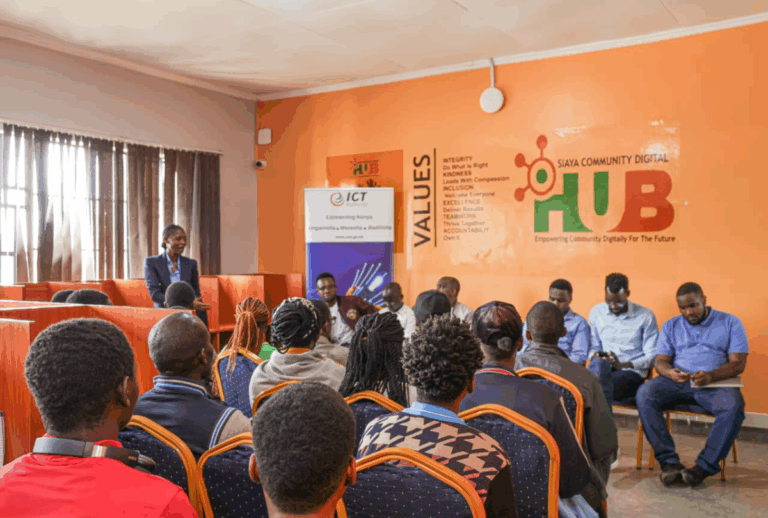In the lakeside town of Bondo, Siaya County, a quiet but transformative revolution is underway. The ICT Authority, in partnership with the Siaya Community Digital Hub, has launched a pre-summit digital skills training session aimed at equipping local youth with practical digital competencies—an initiative that could redefine the county’s economic landscape.
The event, held at the Siaya Community Digital Hub, was attended by scores of young people eager to tap into the digital economy. Representing the ICT Authority, Deputy Director Alex Njihia underscored the government’s commitment to democratizing technology and ensuring that no Kenyan is left behind in the digital age.
“Digital skills are no longer optional,” Njihia stated. “They are the foundation for employability, innovation, and entrepreneurship in the 21st-century economy. What we are doing here in Siaya is creating pathways for youth to participate meaningfully in the digital workforce—locally and globally.”
A Vision Rooted in Local Leadership
The initiative’s success owes much to the vision of Dr. Oburu Odinga, Siaya Senator and founder of the Siaya Community Digital Hub. Since its inception, the hub has positioned itself as a bridge between rural communities and global opportunities—offering training, mentorship, and access to digital infrastructure for young people in Siaya and its environs.
“The digital economy must be inclusive,” Dr. Oburu remarked during the launch. “We cannot talk about national progress if young people in rural Kenya are digitally excluded. Through this partnership, we are ensuring that Siaya’s youth have the skills and confidence to compete in the global job market.”
Part of a Bigger National Agenda
The training session aligns with Kenya’s Digital Transformation Agenda under the Ministry of Information, Communications and the Digital Economy, which seeks to empower citizens with technology-driven economic tools. Through the Ajira Digital Program, Jitume Initiative, and the establishment of community digital innovation hubs, the government aims to train millions of youth in digital literacy, freelancing, and entrepreneurship.
According to data from the ICT Authority, Kenya’s digital economy contributes over 7.7% to GDP, and the sector continues to be one of the fastest-growing job creators. However, digital inequality—especially in rural areas—remains a key barrier. Siaya, with its mix of rural and urban demographics, represents both a challenge and an opportunity for digital inclusion.
Inside the Training: Skills for the Future
Participants in the Bondo session received hands-on training in basic computing, online work platforms, cybersecurity awareness, and digital entrepreneurship. Facilitators emphasized practical applications—how to set up online profiles, bid for remote jobs, create digital content, and even leverage government e-services.
For many attendees, it was their first structured exposure to the possibilities of digital work.
“I’ve always wanted to work online but didn’t know where to start,” said Mary Achieng, a 24-year-old graduate from Bondo. “Now I can create a professional portfolio and apply for freelance writing jobs on Upwork. It’s like new doors are opening for us.”
Impact Beyond Training
Beyond skills transfer, the program aims to build digital ecosystems that can sustain innovation within local communities. The Siaya Community Digital Hub, equipped with computers, internet access, and mentorship spaces, serves as an incubator for startups, digital freelancers, and social innovators.
Deputy Director Njihia hinted at future collaborations with private sector tech partners and development agencies to expand the program’s reach, ensuring that more counties benefit from similar interventions.
“This is not a one-off event,” he said. “We’re building a pipeline of opportunities—from training to employment to innovation. Siaya is a pilot example of how public-private-community partnerships can work.”
Challenges on the Road to Inclusion
Despite the optimism, experts warn that structural challenges could slow progress. Limited internet connectivity in rural areas, high data costs, and inadequate access to devices remain pressing issues. Moreover, sustaining engagement beyond initial training requires consistent funding, mentorship, and market linkages.
A digital policy expert based in Kisumu noted, “If hubs like Siaya’s are to thrive, they must evolve into self-sustaining ecosystems. That means partnerships with local businesses, government agencies, and international digital marketplaces.”
A County on the Cusp of Digital Transformation
As the sun set over Bondo that evening, the training participants left with new skills—and renewed hope. For a region often defined by agricultural livelihoods, the notion that a young person from Siaya can now earn a living writing code, offering virtual assistance, or designing graphics for global clients marks a profound shift.
In essence, the ICT Authority’s collaboration with the Siaya Community Digital Hub is more than just a training session; it’s a blueprint for how digital inclusion can drive local empowerment and national development.
If sustained and scaled, such initiatives could very well make Siaya—and other counties like it—pillars of Kenya’s digital future.
About the Partners
ICT Authority (ICTA): A government agency under the Ministry of ICT and Digital Economy, mandated to champion Kenya’s digital transformation through infrastructure, policy, and capacity development.
Siaya Community Digital Hub: A community-based innovation center founded by Senator Dr. Oburu Odinga, offering ICT training, innovation incubation, and access to online work opportunities.

